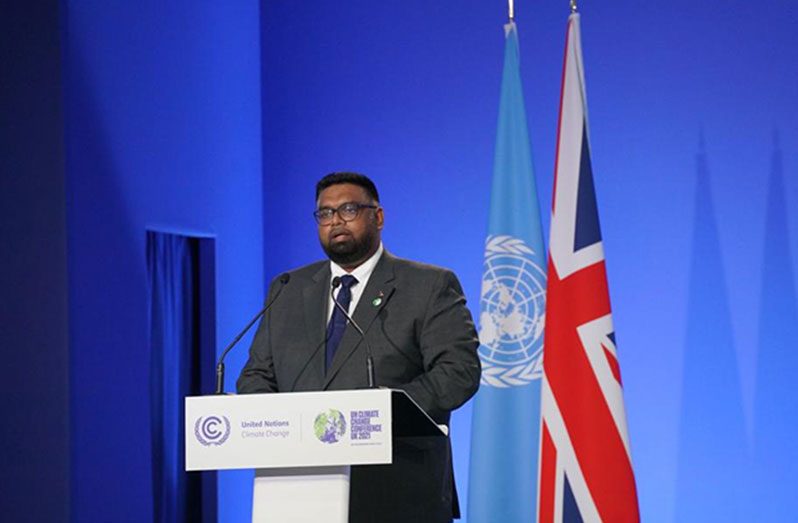–President Ali says, reiterates call for developed world to fulfil climate financing commitments
AS the world continues to contend with the challenges created by climate change, President Dr. Irfaan Ali has said that Guyana will work with local communities to conserve, protect and sustainably manage its forests, biodiversity and freshwater supplies, and at the same time reduce its carbon emissions by at least 70 per cent by 2030.
During his address to world leaders at the 26th United Nations Climate Change Conference of the Parties (COP26) in Glasgow, Scotland, President Ali said that the reduction in carbon emissions will be achieved through a “cleaner” energy mix, which will include solar power, wind, ‘hydro’ and natural gas.
The Guyana Head of State elucidated that Guyana is already playing its part in addressing climate change, and will continue to do so. And, in doing so, the country will maintain its diverse forest, which is almost the size of England and Scotland combined, and stores 20 gigatons of carbon.
President Ali reminded that efforts to limit the earth’s temperature increase to 1.5 degrees Celsius above pre-industrial levels, which is enshrined in Article 2 of the 2016 Paris Climate Accord as the world’s official goal for how much it is agreed that the planet warms, are far behind. The President was adamant that world leaders could use COP26 to change the present trajectory.
Climate change presents an ultimatum to world leaders to either take immediate, drastic action, or otherwise subject humanity to an infernal global disaster, so the decisions made at COP26, in President Ali’s view, will determine the fate of civilisation.
Warning that indifference amongst stakeholders, or their inaction will be costly to the world at large, Dr. Ali related that the coming decade must be one of decisive action.
“Climate change affects us all; rich, poor, developed and developing states, but its effects are more severe on the poorest and most vulnerable, especially small island developing states, and low-lying coastal states. For us, it is a question of survival,” he said.
It is for this reason that President Ali advised that there must be immediate action on three fronts. The first, he said, is that countries must set more ambitious goals to reduce emissions, which must be honoured, with the world’s foremost polluters playing a greater part to institute steeper emission cuts.
Secondly, he charged that the pledge made in 2009 at COP15 in Copenhagen, where it was agreed that developed countries will deliver climate financing of $100 billion a year by 2020 to developing countries, must be met. On this note, President Ali warned that dishonoured pledges are a recipe for disaster.
Thirdly, he said that the forest constitutes a “powerful arsenal” in the fight against climate change, and it is for this reason that forest-risk countries must be provided with incentives which are necessary to keep their forests intact, and to reduce deforestation and forest degradation.
“Mindful that deforestation contributes 16 per cent to annual global emissions, and in recognition of the ecosystem and climate services provided by forests, it is imperative that we finalise the rules for carbon markets and REDD+ so as to properly value tropical forests, and the climate services which they provide,” President Ali related.
Those recommendations made by the Head of State are in line with the goals of COP26.
“We are at a historic moment in our civilisation. History must not judge us as having only counted our losses; it must instead herald our efforts to confront one of our planet’s greatest threats: Climate change,” President Ali said.
To see that the goals intended to combat climate change are met, Guyana is prepared to work with the international community for collective action, and support the position of a number of regional and international organisations which have a mandate to prevent actions which contribute to climate change.
“We support the position of CARICOM, and are aligned with the Alliance for Small Island States (AOSIS), the Community of Latin America and Caribbean States [CELAC], the Leticia Pact, the DHAKA-Glasgow Declaration, and the Glasgow Leaders’ Declaration on Forest and Land Use among others,” Dr. Ali said.
While some might argue that Guyana’s position on climate change might be conflicting, as the country is now rapidly pursuing oil exploration and production in a bid to propel the small South American nation’s development, the country has crafted a blueprint which will allow it to pursue its economic development, and at the same time achieve its climate goals.
That blueprint is an upgraded Low-Carbon Development Strategy (LCDS) 2030, which was released on Thursday last for public consultation.
Dr. Ali told world leaders in Glasglow that Guyana will also invest in low-carbon opportunities for jobs, ecosystem services and social inclusion, all through the expanded Low-Carbon Development Strategy.
“Though we recently became an oil producer, we support the removal of subsidies from fossil fuel production, and advocate a strong global carbon price. Let future generations say when it mattered the most, we made a difference,” he said.



.jpg)











